If you're looking to sharpen your skills in intelligence analysis, there are some key books you shouldn't miss. "Psychology of Intelligence Analysis" helps you understand decision-making, while "Structured Analytic Techniques" provides practical problem-solving methods. "A Tradecraft Primer" is great for enhancing creativity in analysis. Additionally, "Intelligence Analysis in the Digital Age" tackles modern complexities. Want to explore more recommendations and tips? There's plenty more to discover that can elevate your analytical abilities.
Key Takeaways
- Explore "Psychology of Intelligence Analysis" for insights on cognitive psychology's impact on decision-making in intelligence work.
- "Structured Analytic Techniques for Intelligence Analysis" offers practical frameworks with real-world examples to enhance systematic problem-solving skills.
- For aspiring analysts, "Intelligence Analysis Fundamentals" provides essential techniques and applications, making it a valuable resource to develop critical skills.
- "Cases in Intelligence Analysis" presents engaging narratives that explore diverse case studies, fostering a deeper understanding of analytical processes.
- "Offensive Intelligence" introduces 300 investigative techniques and tools, focusing on open-source intelligence (OSINT) for practical application in intelligence work.
Psychology of Intelligence Analysis
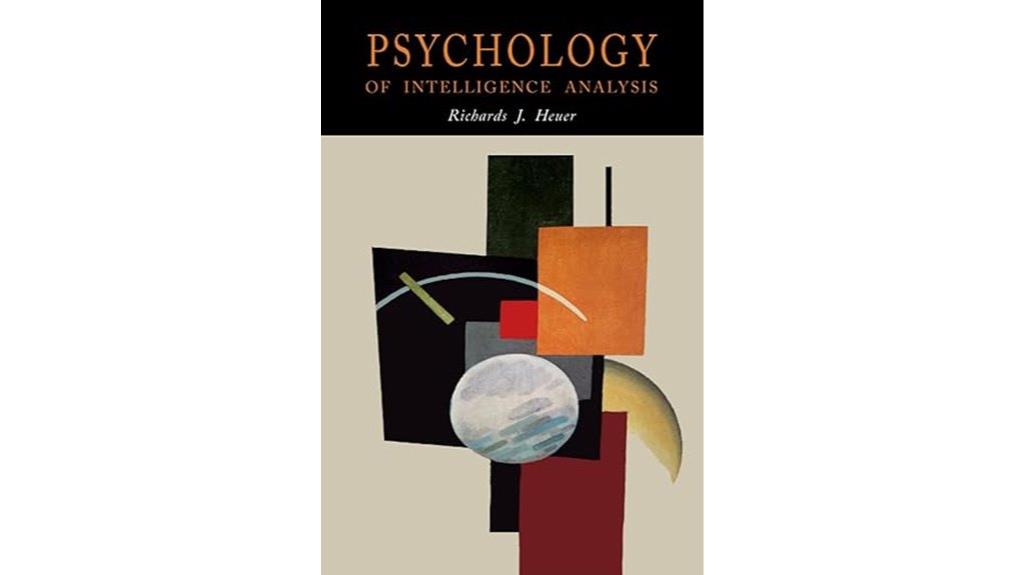
If you're diving into the world of intelligence analysis, "Psychology of Intelligence Analysis" is a must-read for you. This book blends psychology with analytical techniques, serving as a solid foundation for analysts and leaders. It's packed with articles from the CIA, focusing on cognitive psychology's role in decision-making. While some chapters are textbook-like, others are surprisingly engaging. Readers like me have found it helps reflect on our analytical methods, enhancing our critical thinking skills. Just be cautious with the Kindle version; I recommend checking out the free PDF from the CIA library for a better reading experience.
Best For: Individuals pursuing a career in intelligence analysis or related fields, such as law enforcement and legal professions.
Pros:
- Insightful content that combines psychology with analytical techniques, enhancing understanding of cognitive processes in decision-making.
- Encourages self-reflection on analytical methods, helping readers improve their critical thinking and information processing skills.
- Accessible and engaging writing style in several chapters, making complex concepts easier to understand.
Cons:
- Quality issues with the Kindle version, including poor scans and formatting problems that hinder the reading experience.
- Not suitable for everyone, particularly those outside the intelligence analysis field, as some may find the content irrelevant.
- Some concepts may be outdated since the articles were published between 1978-1986, which may require readers to seek updated resources.
Structured Analytic Techniques for Intelligence Analysis

"Structured Analytic Techniques for Intelligence Analysis" stands out as an indispensable resource for intelligence analysts, law enforcement professionals, and business strategists alike. This book breaks down complex methods into practical steps, helping us tackle problems systematically while avoiding cognitive biases. With sixty-six structured techniques, including nine new ones in the third edition, it's well-organized for easy navigation. The examples provided enhance our understanding and real-world application. While some users have raised concerns about its physical quality, the content remains a high-quality guide for anyone looking to sharpen their analytical skills. I highly recommend it for teaching and practical application.
Best For: Intelligence analysts, law enforcement professionals, and business strategists looking to enhance their analytical skills.
Pros:
- Comprehensive coverage of sixty-six structured analytic techniques, including nine new ones in the third edition.
- Well-organized layout with practical examples that facilitate real-world application of the techniques.
- Effective for teaching and reference in both public and private sectors, helping users understand various analytical problems.
Cons:
- Several users have reported concerns about the physical quality of the book, including durability and condition upon arrival.
- Complaints about inflated pricing relative to the book's sturdiness and overall appearance.
- Some eBook versions have been noted to have missing chapters, affecting the overall experience for digital readers.
A Tradecraft Primer: Structured Analytic Techniques for Intelligence Analysis
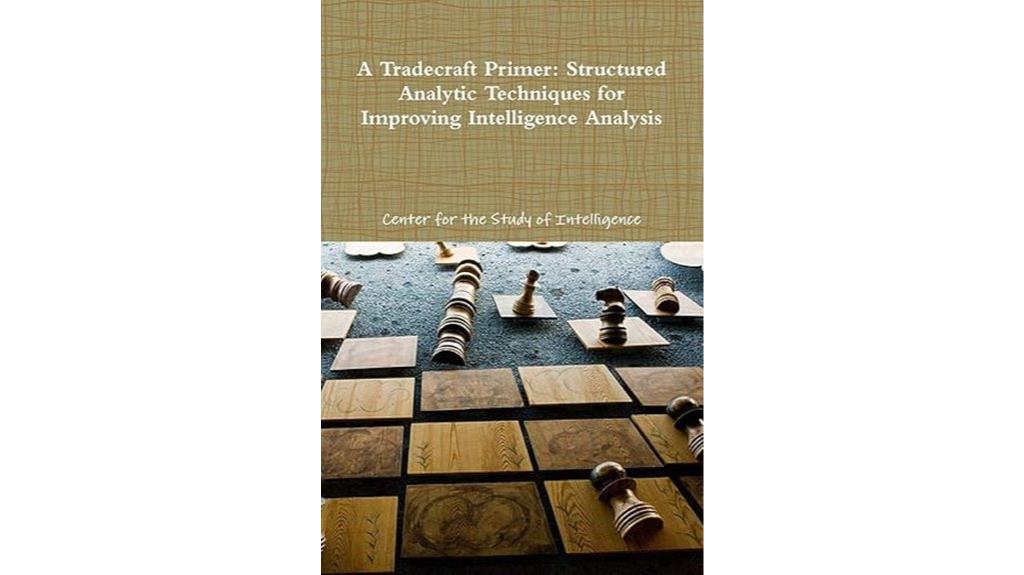
For anyone stepping into the world of intelligence analysis, "A Tradecraft Primer: Structured Analytic Techniques for Intelligence Analysis" is an invaluable resource. This book dives into structured techniques that enhance analytical thinking, helping you challenge your judgments and stimulate creativity. I found it particularly useful in maneuvering complex questions and managing uncertainty. Best of all, you can access it online, so you don't need to purchase a copy unless you prefer a hard version. While some readers mention the small print as a drawback, the practical insights are worth it for anyone looking to sharpen their analytical skills.
Best For: Individuals entering the intelligence field who want to enhance their analytical skills through structured techniques.
Pros:
- Provides practical insights to improve decision-making and analytical thinking.
- Accessible online, allowing easy access without the need to purchase a hard copy.
- Helps manage uncertainty and tackle complex questions effectively.
Cons:
- Some readers find the small print size difficult to read.
- Not a comprehensive guide on intelligence analysis; focuses primarily on structured techniques.
- May require regular practice to fully benefit from the techniques presented.
Intelligence Analysis Fundamentals
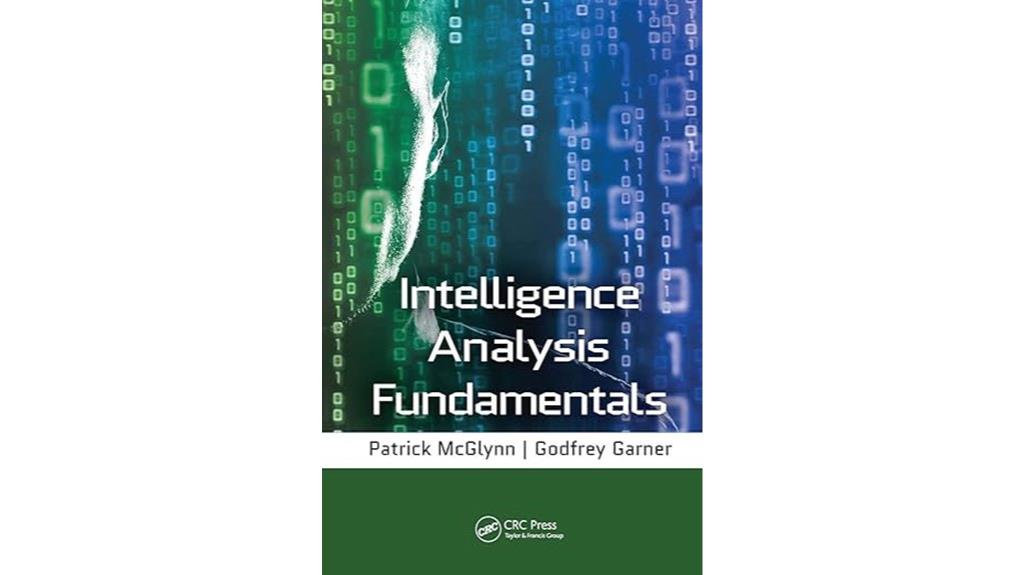
Intelligence Analysis Fundamentals stands out as an ideal resource for aspiring analysts and those looking to deepen their understanding of intelligence principles. This book offers essential techniques for effective data analysis, making it accessible to both beginners and seasoned professionals. It covers crucial topics like data collection, analysis methods, and ethical considerations, enriched with practical examples and case studies. Authored by current intelligence community members, it reflects real-world applications, particularly in counterterrorism and joint operations. Whether you're a student or a practitioner, this text provides valuable insights and methodologies that are relevant across various sectors, including homeland security and law enforcement.
Best For: Aspiring analysts and professionals seeking to enhance their understanding of intelligence analysis principles and practices.
Pros:
- Provides essential techniques for effective data analysis that are accessible to all skill levels.
- Includes practical examples and case studies that enhance learning and application in real-world scenarios.
- Authored by experienced members of the intelligence community, ensuring relevance to current practices in counterterrorism and joint operations.
Cons:
- May not cover advanced analytical techniques in depth, limiting its usefulness for experienced professionals.
- Some readers may find the focus on military-style methods less applicable to certain civilian contexts.
- The general nature of the content might not meet the specific needs of specialized intelligence fields.
Intelligence Analysis: A Target-Centric Approach
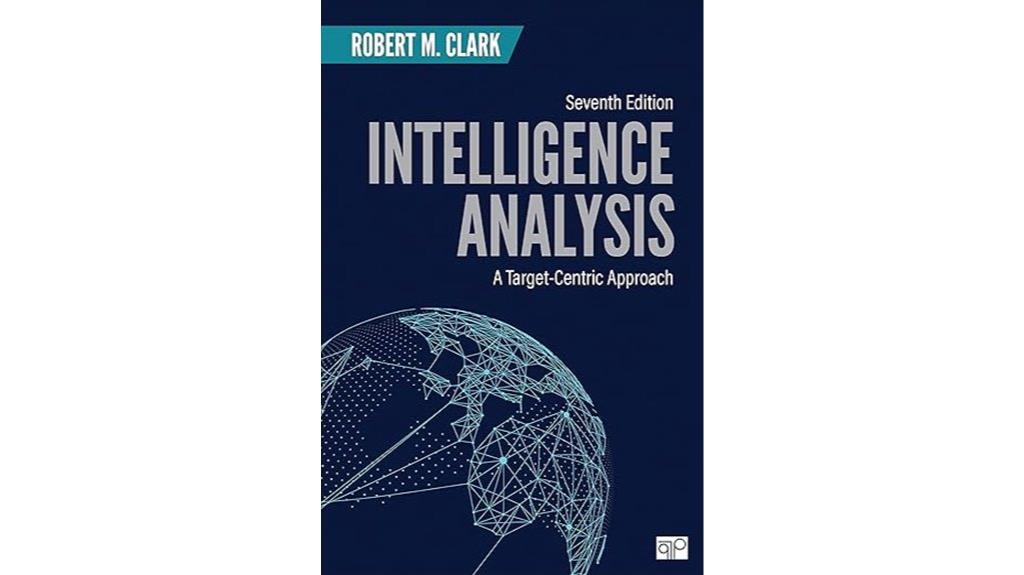
In my view, Robert M. Clark's "Intelligence Analysis: A Target-Centric Approach" is crucial for anyone serious about intelligence work. This Seventh Edition emphasizes a collaborative method that truly resonates with me. The book outlines a structured approach to the intelligence cycle, helping us tackle questions systematically. I appreciate Clark's focus on emerging areas like prescriptive intelligence, showcasing the field's evolution. The end-of-chapter questions stimulate engaging discussions, making it practical for both students and professionals. Additionally, it addresses the challenges of information hoarding, reminding us how important collaboration is for effective intelligence analysis. This book sharpened my analytical skills immensely.
Best For: This book is best for students and professionals in the field of intelligence analysis seeking to enhance their analytical skills and collaborative practices.
Pros:
- Structured Approach: Provides a clear methodology for tackling the intelligence cycle and analyzing questions systematically.
- Emerging Insights: Highlights advancements like prescriptive intelligence, keeping readers informed of the evolving landscape in intelligence analysis.
- Engaging Discussions: End-of-chapter questions foster classroom engagement and practical application of theoretical concepts.
Cons:
- Information Overload: The comprehensive nature of the content may overwhelm new readers or those unfamiliar with the field.
- Potentially Dense: Some sections may require careful reading and re-reading to fully grasp the complex concepts presented.
- Limited Case Studies: While it covers theoretical insights well, it may lack extensive real-world case studies to illustrate practical applications.
A Handbook for Intelligence and Crime Analysis
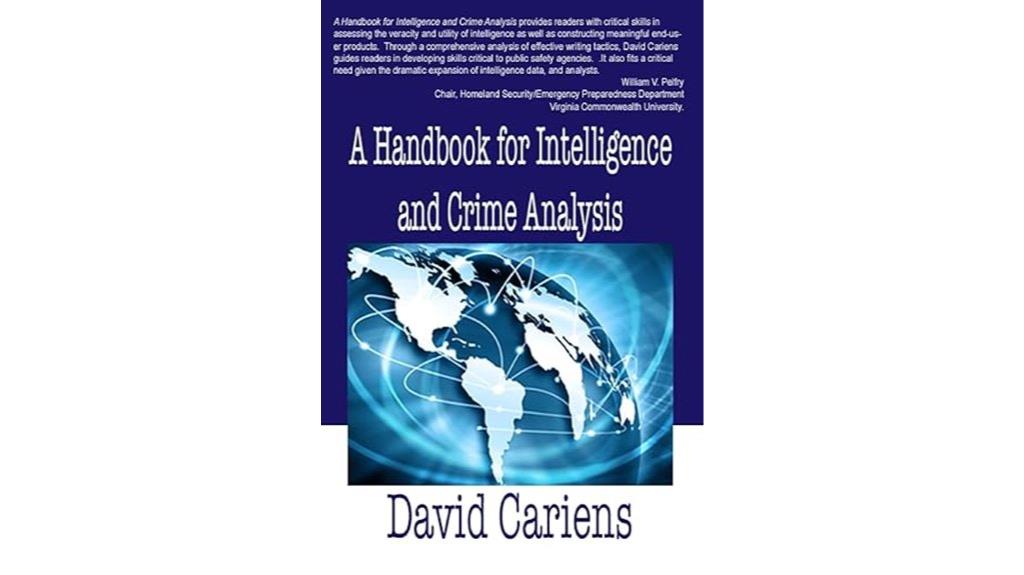
New analysts stepping into the world of law enforcement and intelligence will find "A Handbook for Intelligence and Crime Analysis" to be an indispensable resource. Authored by David Cariens, a seasoned CIA analyst, this book expertly navigates the complexities of intelligence analysis. It focuses on developing essential analytical writing skills, offering practical takeaways that challenge existing assumptions. With each chapter encouraging critical questioning, this handbook prepares you for the evolving landscape of intelligence work. As the amount of data grows, having this guide in your reference library is vital for honing your skills and maintaining integrity in your analysis.
Best For: New analysts in law enforcement and intelligence looking to develop their analytical writing skills and navigate the complexities of intelligence analysis.
Pros:
- Provides practical guidance on effective analytical writing tactics and critical questioning.
- Authored by a seasoned CIA analyst, ensuring credibility and relevance to the field.
- Encourages in-depth analysis and challenges existing assumptions, fostering continuous improvement.
Cons:
- May be too basic for experienced analysts who are already familiar with analytical writing concepts.
- The focus on writing skills might not cover all aspects of intelligence analysis in detail.
- Some readers may find the structure less engaging if they prefer more interactive or visual learning methods.
Methods of Inquiry for Intelligence Analysis
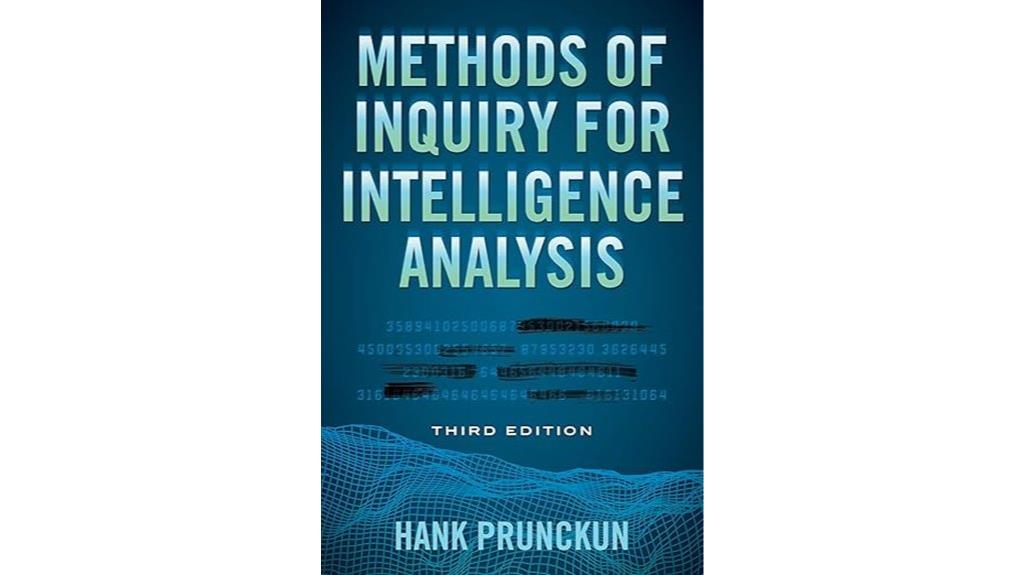
For aspiring intelligence analysts and seasoned professionals alike, "Methods of Inquiry for Intelligence Analysis" stands out as an essential resource, especially in today's complex landscape. This book highlights the evolution of intelligence, particularly following 9/11, and the resulting demand for skilled analysts. It emphasizes the importance of understanding intelligence within a broader research framework. By covering key elements of applied research, it prepares you for the challenges ahead. I appreciate its focus on operational methods specific to the field. Plus, the fast delivery and quality make it a must-have for anyone serious about honing their analytic skills.
Best For: This book is best for aspiring intelligence analysts and seasoned professionals seeking to enhance their analytic skills within a complex intelligence landscape.
Pros:
- Provides essential analytic skills tailored for intelligence work.
- Covers key elements of applied research relevant to the field.
- Noted for fast delivery and good quality, making it a reliable resource.
Cons:
- May be too advanced for beginners with no prior knowledge of intelligence analysis.
- Focus on post-9/11 intelligence may not appeal to those interested in historical contexts.
- Limited practical examples may leave some readers wanting more hands-on applications.
Critical Thinking and Intelligence Analysis (Second Edition)
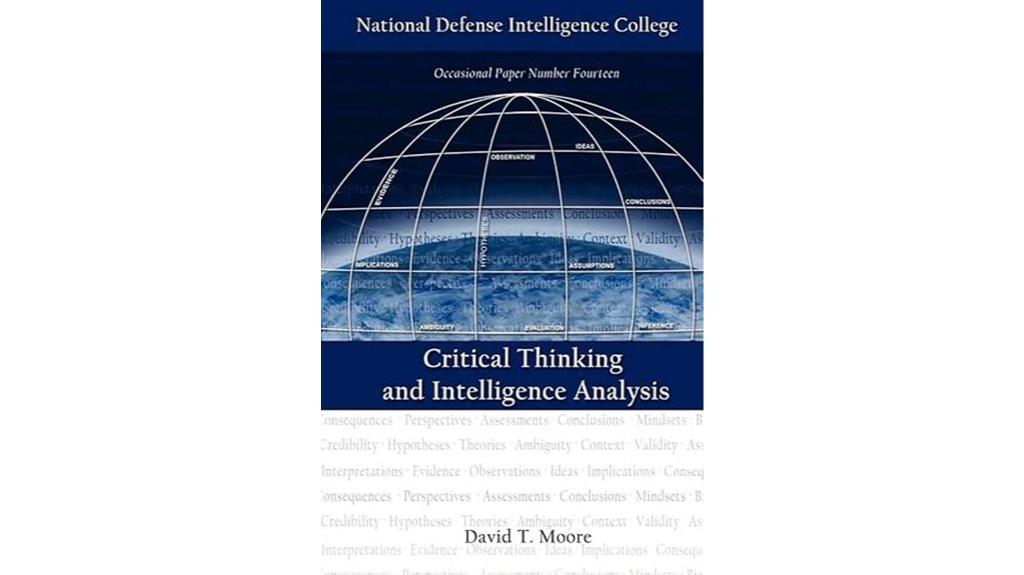
David Moore's "Critical Thinking and Intelligence Analysis" stands out as an essential read for anyone involved in the U.S. Intelligence Community. This book isn't just a technical guide; it dives deep into the cognitive processes that drive effective analysis. Moore emphasizes that critical thinking is vital, urging analysts to challenge their reasoning continuously. He uses historical examples, like the Cuban Missile Crisis, to illustrate lessons learned from past mistakes. While some sections may feel repetitive, this resource remains invaluable for students and professionals looking to refine their analytical skills and enhance their understanding of intelligence processes.
Best For: Students and professionals in the U.S. Intelligence Community looking to enhance their critical thinking and analytical skills.
Pros:
- Provides a deep exploration of cognitive processes crucial for effective intelligence analysis.
- Utilizes historical examples to illustrate lessons learned, making concepts relatable and applicable.
- Serves as an accessible resource for understanding the importance of critical thinking in intelligence work.
Cons:
- Some sections may feel repetitive, lacking depth in later discussions.
- May not offer substantial new insights for those already familiar with basic concepts of intelligence analysis.
- Focus on cognitive processes might not appeal to readers seeking a more technical or mechanical guide.
Cases in Intelligence Analysis: Structured Analytic Techniques in Action
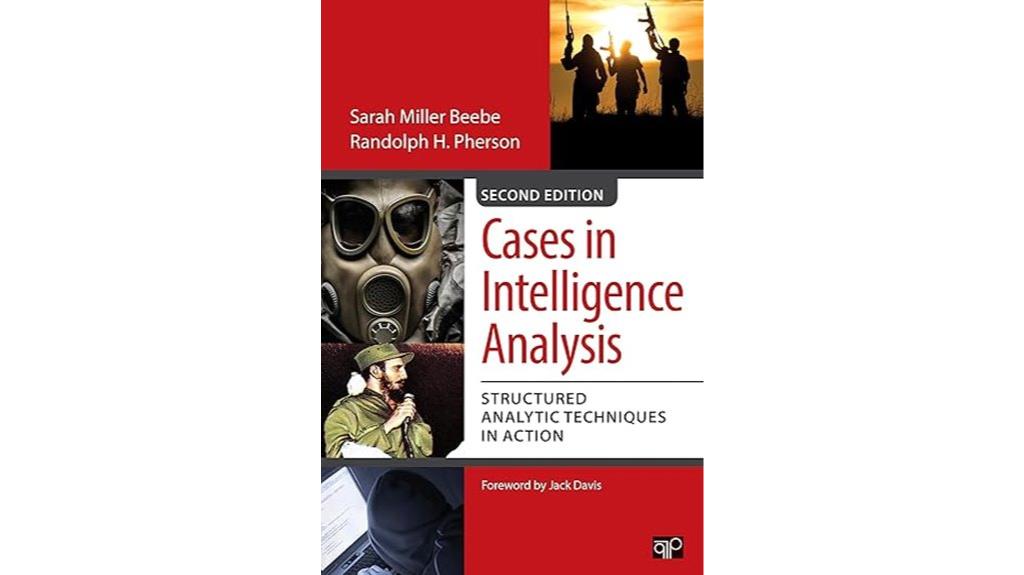
"Cases in Intelligence Analysis: Structured Analytic Techniques in Action" stands out as an essential resource for students and newcomers enthusiastic to plunge into the complexities of government intelligence analysis. This book complements Pherson and Heuer's work by providing seventeen diverse case studies that cover critical areas like counterintelligence and terrorism. Each case features enthralling narratives and engaging exercises that challenge you to think systematically. With detailed instructor materials available online, it supports effective learning. While some users faced access issues, the overall feedback is overwhelmingly positive. It's a valuable investment for anyone serious about honing their analytic skills.
Best For: Students and newcomers interested in gaining practical insights into government intelligence analysis through engaging case studies and structured analytic techniques.
Pros:
- Engaging narratives and diverse case studies that enhance understanding of various intelligence topics.
- Includes detailed instructor materials to support effective teaching and learning.
- Positive user feedback highlights its effectiveness as a learning tool for analytic skills.
Cons:
- Some users reported difficulties accessing the online instructor materials.
- The book's cover has been noted for its slimy feel, which may detract from the overall experience.
- Some case studies are perceived as incomplete, lacking full actual information.
The Art of Intelligence: Lessons from a Life in the CIA

If you're keen on understanding the intricate world of intelligence work, "The Art of Intelligence: Lessons from a Life in the CIA" by Henry Crumpton is a must-read. Crumpton's firsthand experiences in the CIA's Clandestine Service during the Afghanistan campaign post-9/11 provide invaluable insights. He expertly discusses counterterrorism operations against al Qaeda and the Taliban, emphasizing the importance of local relationships. Crumpton also critiques the political challenges intelligence agencies face, shedding light on operational failures. His engaging storytelling and personal reflections make complex topics accessible, inspiring future generations to contemplate careers in intelligence and public service. This book is essential for anyone interested in espionage.
Best For: Those interested in a real-world perspective on espionage and counterterrorism, particularly in the context of U.S. national security.
Pros:
- Offers firsthand accounts from a seasoned CIA operative, providing unique insights into intelligence work.
- Engaging storytelling makes complex intelligence topics accessible and relatable to a wider audience.
- Encourages interest in careers in intelligence and public service through personal reflections and lessons learned.
Cons:
- May not delve deeply into technical aspects of espionage that some readers might expect.
- Critiques of political challenges may be seen as biased or one-sided by some readers.
- The focus on personal experiences may overshadow broader historical contexts for some topics discussed.
Intelligence Analysis: How to Think in Complex Environments
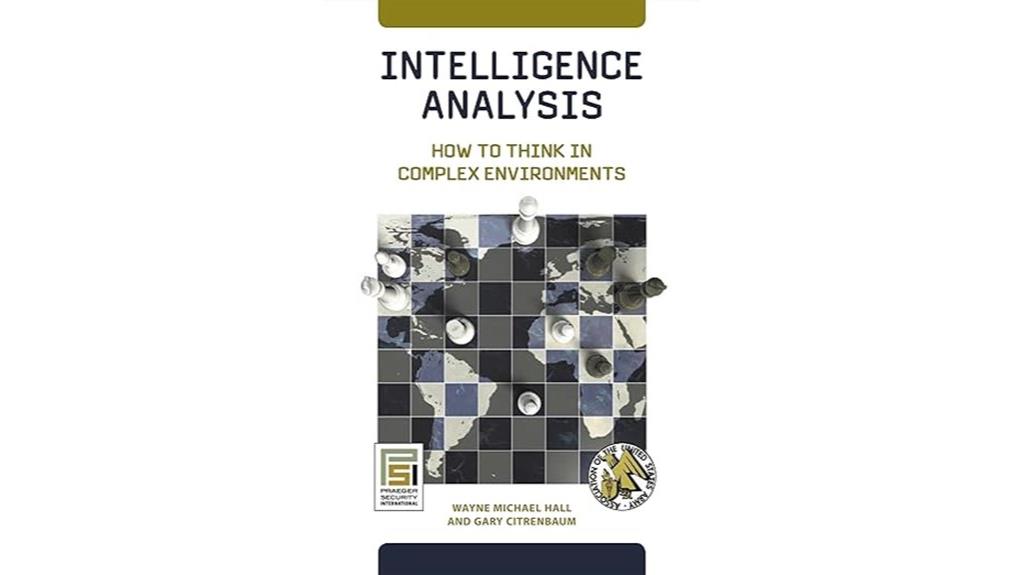
For intelligence analysts and national security professionals looking to enhance their analytical skills in today's complex operational environments, "Intelligence Analysis: How to Think in Complex Environments" is an invaluable resource. Authored by BG (R) Mike Hall and Dr. Gary Citrenbaum, this book emphasizes thinking processes over mere facts. With 21 chapters, it covers essential techniques like decomposition and synthesis, offering a robust framework for tackling intricate issues. While it can be challenging, the insights gained empower readers to navigate modern intelligence challenges effectively. This book is a significant addition to any analyst's library, fostering deeper understanding and insightful discussions.
Best For: Intelligence analysts and national security professionals seeking to enhance their analytical thinking in complex environments.
Pros:
- Provides a comprehensive framework for understanding and applying various analytical techniques.
- Encourages critical thinking and problem-solving skills essential for navigating modern intelligence challenges.
- Stimulates thoughtful discussion and deeper understanding among analysts.
Cons:
- The complexity of the content may be challenging for some readers.
- Limited real-world examples to illustrate theoretical concepts.
- Requires repeated reading for full comprehension and retention of the material.
Think With Full Brain: Power-Up Your Brain
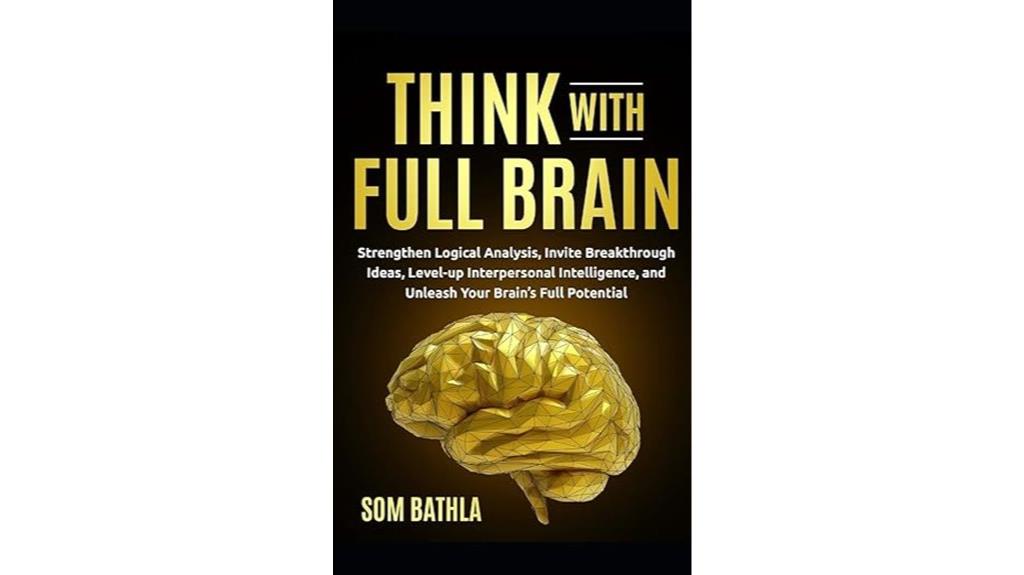
"Think With Full Brain: Power-Up Your Brain" is an excellent choice for anyone enthusiastic to access their cognitive potential and enhance decision-making skills. This book brilliantly combines left and right brain approaches, helping me break free from siloed thinking. I learned that IQ only predicts a small fraction of career success and discovered various thinking styles influenced by culture and gender. The practical strategies for boosting logical and creative thinking, like the "Revolving Door Test" and idea generation techniques, have truly transformed my problem-solving abilities. Plus, the tips on empathy and communication are invaluable for building better relationships.
Best For: Individuals seeking to enhance their cognitive abilities and improve decision-making skills through a balanced approach to thinking.
Pros:
- Comprehensive Approach: Integrates both logical and creative thinking methods for well-rounded problem-solving.
- Practical Strategies: Offers actionable techniques like the "Revolving Door Test" that can be easily implemented in everyday situations.
- Interpersonal Skills Development: Provides valuable insights into empathy and communication, aiding in relationship building.
Cons:
- Cultural Specificity: Some concepts may be more applicable to certain cultural contexts, potentially limiting universal applicability.
- Requires Commitment: The exercises and strategies demand consistent practice and effort, which might be challenging for some readers.
- Limited Depth in Certain Areas: While it covers a broad range of topics, some readers may find specific areas lacking in detailed exploration.
Intelligence Analysis in the Digital Age (Studies in Intelligence)
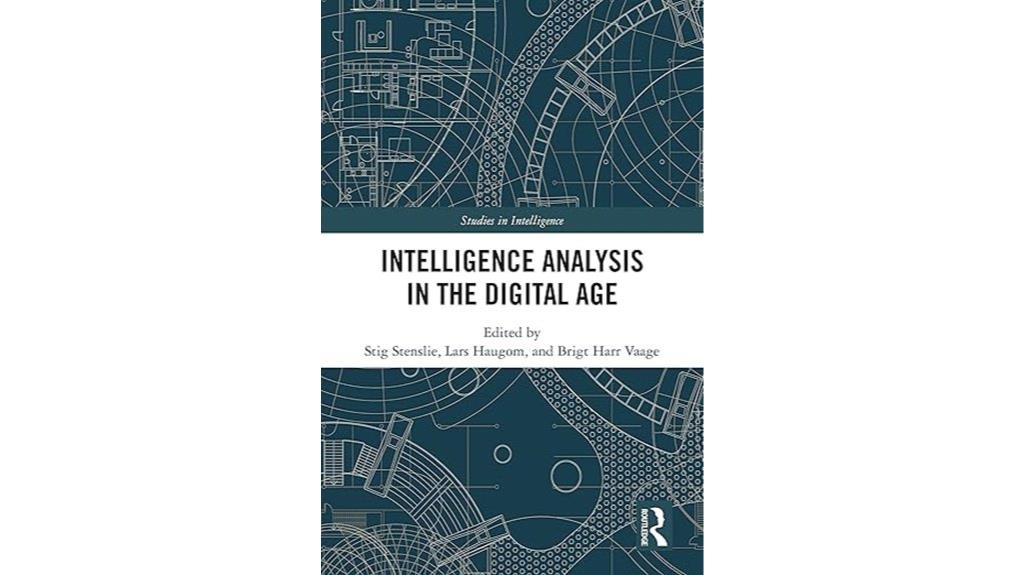
In "Intelligence Analysis in the Digital Age," readers will discover a significant resource tailored for intelligence professionals and policymakers grappling with the complexities of modern information. This book dives deep into how technology has transformed intelligence analysis, emphasizing the rapid pace of information flow. It highlights the challenges decision-makers face in this fast-moving environment, where timely, relevant, and reliable intelligence is essential. The text also underscores the shift from traditional methods to a more analytical approach, making assessments as important as uncovering secrets. If you're looking to sharpen your skills in today's digital landscape, this book is a must-read.
Best For: Intelligence professionals and policymakers seeking to enhance their analytical skills in a digital information landscape.
Pros:
- Provides insights into the evolving nature of intelligence analysis in the digital age.
- Highlights the importance of timely and reliable intelligence for effective decision-making.
- Emphasizes the need for skilled analysts and a more analytical approach to assessments.
Cons:
- May be too technical for readers without a background in intelligence or data analysis.
- Focus on digital challenges may overlook traditional intelligence methodologies.
- The rapid pace of information flow discussed may feel overwhelming for some readers.
Crime and Intelligence Analysis: An Integrated Real-Time Approach
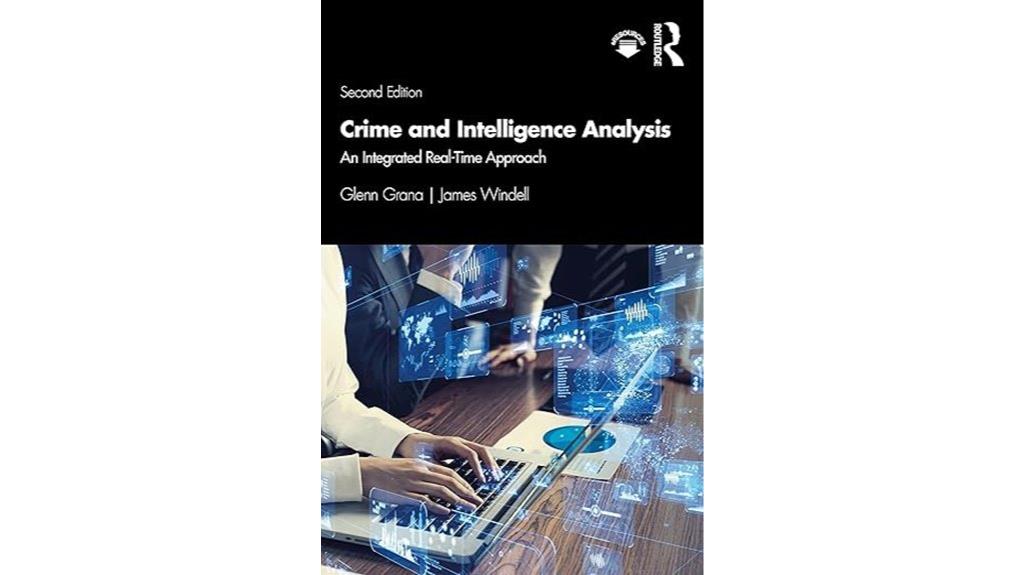
Designed specifically for crime and tactical analysts, "Crime and Intelligence Analysis: An Integrated Real-Time Approach, 2nd Edition" stands out as an essential resource. It dives deep into the criminal justice system, helping us understand criminal behavior and its broader implications. I appreciate the focus on analytical techniques, like temporal and spatial analysis, which sharpen our skills in evaluating data and predicting criminal activity. The inclusion of research methods enhances our critical thinking, making us more effective problem solvers. Plus, the new chapter on terrorism addresses contemporary threats, ensuring we're well-prepared for today's challenges in law enforcement.
Best For: Crime analysts and tactical analysts seeking to enhance their understanding of criminal behavior and analytical techniques.
Pros:
- Comprehensive Coverage: Offers in-depth insights into the criminal justice system and crime analysis methodologies.
- Practical Techniques: Equips readers with valuable skills in temporal and spatial analysis for effective crime pattern evaluation.
- Current Relevance: Includes a chapter on terrorism, addressing modern law enforcement challenges and threats.
Cons:
- Complexity of Content: May be challenging for beginners due to the advanced nature of some analytical techniques.
- Limited Focus on Non-Criminal Aspects: Primarily concentrates on crime analysis, potentially overlooking broader social contexts.
- Potentially Outdated Examples: Some case studies or examples may not reflect the latest developments in crime trends or technology.
OFFENSIVE INTELLIGENCE: Techniques, Tools, and Tips for Business and Beyond
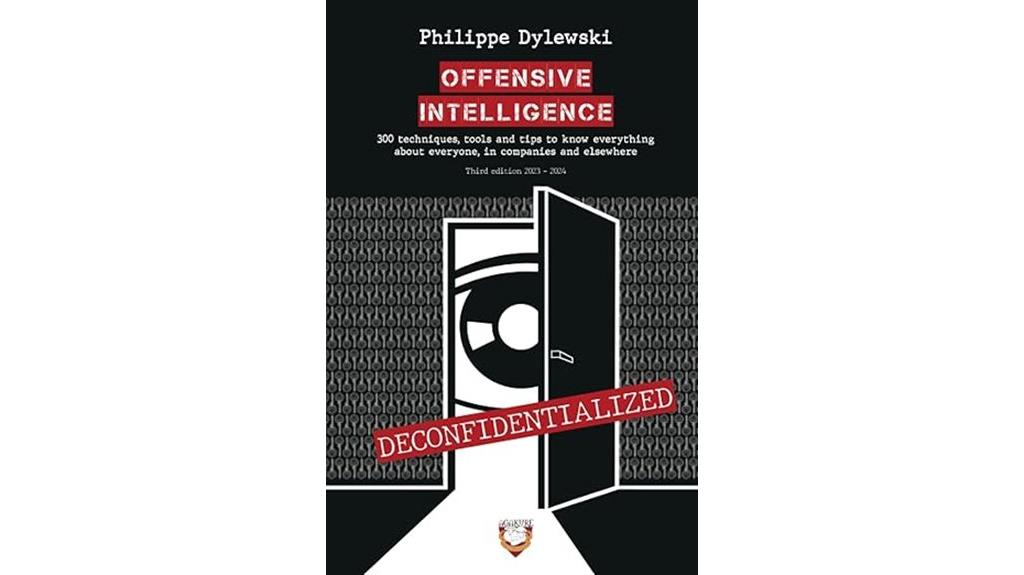
For anyone involved in investigative work, whether as a journalist, lawyer, or business executive, "Offensive Intelligence: Techniques, Tools, and Tips for Business and Beyond" stands out as an indispensable resource. This all-encompassing guide offers 300 techniques and tools aimed at uncovering crucial information about individuals and businesses. I love how it emphasizes open-source intelligence, helping professionals develop practical skills like advanced Google research and Darkweb navigation. Philippe Dylewski's insights are invaluable, providing strategies that I've found useful for everything from competitive analysis to fraud detection. It's a must-have reference for anyone serious about enhancing their investigative capabilities.
Best For: Professionals involved in investigative work, including journalists, lawyers, business executives, and security managers seeking to enhance their information-gathering skills.
Pros:
- Comprehensive guide with 300 techniques and tools for various investigative needs.
- Emphasizes open-source intelligence (OSINT), making it accessible for non-technical users.
- Practical applications across multiple fields, enhancing skills in competitive analysis and fraud detection.
Cons:
- May not guarantee instant mastery of the skills presented, requiring further practice and application.
- Some readers report occasional printing issues with the physical book format.
- Could be overwhelming for beginners due to the vast amount of information provided.
Factors to Consider When Choosing Intelligence Analysis Books

When I choose intelligence analysis books, I focus on a few key factors. I consider the target audience and whether the content is clear and practical. Plus, the author's credentials can really make a difference in how I absorb the information.
Target Audience Relevance
Choosing the right intelligence analysis book hinges on understanding your target audience. It's crucial to recognize that different texts cater to various expertise levels, from beginners to seasoned professionals. If you're pursuing a career in the intelligence community or law enforcement, you'll want books tailored to those fields. For instance, "Psychology of Intelligence Analysis" may not suit those outside this domain, like crime analysts, as its content might not align with their needs. Additionally, consider the complexity of the material; selecting a book that matches your current knowledge guarantees you grasp the concepts effectively. Finally, look for texts that offer practical applications, as these insights can greatly benefit your real-world intelligence analysis roles.
Content Depth and Clarity
Understanding your target audience sets the stage for evaluating the depth and clarity of intelligence analysis books. I've noticed that the content depth varies widely; some texts provide extensive insights into structured analytic techniques, while others are just introductory guides for beginners. Clarity is equally important—effective books break down complex concepts into digestible sections, enhancing learning. I appreciate those that include practical examples and case studies, as they help illustrate theoretical ideas and make them relatable. A well-organized book, with clear headings, bullet points, and summaries, allows me to navigate different methodologies easily. Also, authors with real-world experience in intelligence often convey valuable insights that enrich the text, making it even more beneficial for my analytical journey.
Practical Application Techniques
While exploring intelligence analysis books, I focus on those that offer structured analytic techniques, as they provide clear, practical steps for tackling complex problems. I also look for titles that include real-world case studies and exercises, which enhance my understanding by allowing me to apply concepts in practical scenarios. Resources that emphasize cognitive functions like decomposition and synthesis are essential, as they improve my critical thinking and decision-making skills. It's vital to evaluate texts that address modern challenges, especially the digital age's impact on intelligence analysis, ensuring that techniques remain relevant. Finally, I prefer books that promote interactive learning, including discussion questions and hands-on activities, to keep me actively engaged in the learning process.
Author Credentials and Expertise
When I immerse myself in intelligence analysis books, I can't overlook the importance of the author's credentials and expertise. I always consider their professional background and experience within the intelligence community, since practical insights often come from real-world applications. Authors who've held significant positions in intelligence agencies bring credible expertise and firsthand knowledge that enriches the content. I also look for those who've published other works or contributed to academic journals, indicating their authority in the field. Formal educational qualifications, like degrees in psychology or security studies, can enhance their insights too. Ultimately, I value authors who've trained or mentored within the intelligence community, as they provide valuable frameworks grounded in practical experience.
Format and Accessibility Options
Choosing the right format and accessibility options for intelligence analysis books is essential for a satisfying reading experience. I've noticed that some Kindle versions can be disappointing due to poor scans and lack of visuals, making print editions often a better choice. If you're looking for budget-friendly options, consider freely-downloadable PDFs from official sources, as they can be more reliable than low-quality eBooks. Pay attention to the organization of the book; well-structured texts with features like spiral binding and tabs improve usability. Additionally, it's important to check if the content is up to date, especially in a rapidly evolving field like intelligence analysis. Finally, be cautious about the physical condition of print books, as durability can vary greatly.
Integration of Current Trends
As I explore the world of intelligence analysis literature, it is vital to reflect on how current trends shape our understanding of the field. When selecting books, I prioritize those that address the evolution driven by technological advancements, especially how the digital age impacts information dissemination and analysis techniques. I also look for texts that integrate structured analytic techniques, as these foster clear problem-solving and help avoid cognitive biases. Emphasizing critical thinking skills is significant; it enables analysts to navigate complex scenarios effectively. I seek resources with real-world case studies, which bridge theoretical concepts and practical applications. Finally, I confirm the books I choose reflect ongoing developments in the intelligence community, highlighting collaborative approaches and advancements in prescriptive intelligence.
Frequently Asked Questions
What Are the Key Skills Needed for Intelligence Analysis?
When I think about the key skills needed for intelligence analysis, I immediately consider critical thinking and analytical skills. I also know that strong communication is essential, both in writing and speaking. It's vital to have a good grasp of research methods and data interpretation. Furthermore, adaptability and attention to detail help me navigate complex situations. Cultivating these skills has allowed me to make informed decisions and effectively analyze information.
How Can I Apply Intelligence Analysis in Everyday Decision-Making?
Applying intelligence analysis in my everyday decision-making has transformed how I approach problems. I gather relevant information, assess its credibility, and consider different perspectives before making choices. I often break down complex situations into manageable parts, which helps me identify patterns and potential outcomes. By staying objective and focusing on data, I find I'm more confident in my decisions, whether it's at work or in personal life. It's all about being systematic and informed.
Are There Online Courses for Intelligence Analysis Skills?
Absolutely, there are plenty of online courses for intelligence analysis skills! I've found several platforms like Coursera and Udemy that offer courses tailored to various skill levels. These courses cover everything from basic concepts to advanced analytical techniques. I personally recommend checking out reviews and course outlines to find the best fit for your needs. It's a great way to enhance your skills and apply them in your everyday decision-making!
What Are Common Career Paths in Intelligence Analysis?
Did you know that about 20% of intelligence analysts move into management roles within five years? In my experience, common career paths in intelligence analysis include roles like tactical analyst, strategic analyst, and even positions in cybersecurity. Many analysts also explore opportunities in law enforcement or government agencies. It's fascinating how diverse our field can be, and each path offers unique challenges and rewards that can really shape your career.
How Do I Stay Updated on Intelligence Analysis Trends?
To stay updated on intelligence analysis trends, I regularly follow industry publications, blogs, and podcasts. I subscribe to newsletters from reputable organizations and attend webinars whenever possible. Networking with colleagues and attending conferences also helps me exchange insights and experiences. Additionally, I make it a point to engage with online forums where professionals discuss new methodologies and tools. Staying curious and proactive keeps me informed in this ever-evolving field.
Conclusion
As I sift through these invaluable intelligence analysis books, I can't help but appreciate the blend of theory and practical application they offer. While some explore deep into the psychology behind decisions, others equip us with structured techniques to tackle real-world challenges. Just like maneuvering a complex puzzle, each book adds a unique piece to our understanding. So, whether you're a seasoned analyst or just starting out, there's a treasure trove waiting for you to explore.







